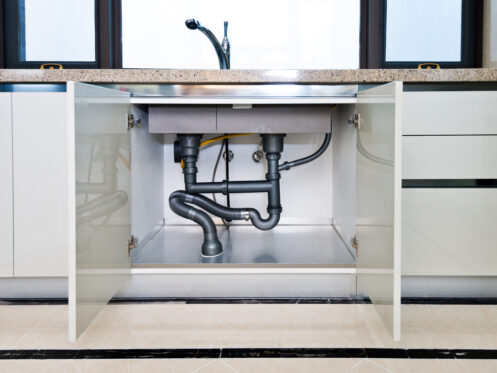You and your family likely use your kitchen sink every day. Whether getting a drink of water for a thirsty toddler or washing veggies for dinner, your sink plays a major role in your everyday routine. Making sure it’s clean and in good condition at all times is critical to keeping this vital piece of your home’s plumbing working optimally.
Start with the Drain
Drains tend to be catch-alls for food particles and other debris, This will break down over time, releasing a foul odor and increasing the risk of drain-blocking clogs. In serious cases, water and other debris could back up into the sink, contaminating anything in the area.
When cleaning your sink, your first task is to remove as much material as you can from the drain. Use baking soda followed by vinegar, which results in a reaction that bubbles away any organic material that has decomposed in the drain over the last weeks or months. Alternatively, you can pour hot water down the drain to loosen and rinse away particles.
You might also want to remove the trap beneath the sink to flush out larger debris that isn’t budged by hot water or the vinegar-and-baking-soda mixture. Once the trap is out, you can use a small brush to scrub the trap and wipe the area thoroughly with a paper towel, sponge, or clean cloth.
Failing to properly clean the drain or trap can result in damage to your plumbing, which can be costly to repair. Regular drain cleaning can also prevent secondary damage associated with water or other backups from occurring, including cracked or leaky drain pipes.
Don’t Forget the Drain Stopper
The drain stopper closes the drain so that you can fill the sink with water. It is held in place by a cylindrical tube that slides down the actual drain. Organic material can slip under the drain stopper and stick to it, preventing a tight seal or even contributing to leaks. Remove the drain stopper and wipe it thoroughly to remove any soap scum or organic buildup.
Tips for Cleaning the Sink
Cleaning the sink requires little more than a sponge, a clean cloth, and a gentle cleaning solution. Foaming solutions, sprays, and even gritty abrasive cleansers can all be good choices: Simply read the label to ensure the cleaning product you choose is appropriate for your sink. If you would prefer a milder cleanser, simply use dish soap and water to cut through the grime and debris currently on and in the sink.
Apply your preferred cleaning product, and allow it to sit for a few minutes to break down greasy spots and soap scum. This makes it easier for you to scrub away the muck without unnecessary strain on your hands, arms, and shoulders. Once the cleanser has done its job, use gentle circular motions with a sponge or cloth to buff away the debris. Use a scrubber to tackle stubborn deposits, but keep the motion gentle to avoid scratching the surface of your sink.
After you have scrubbed the whole sink, rinse it thoroughly with warm water to flush away the soap or cleansing agent. Flush the sink thoroughly before disinfecting it. Use a commercial disinfectant product or a mixture of bleach and water at a rate of four teaspoons of bleach per quart of water in a spray bottle to spray the sink and drain liberally. Use a soft cloth to wipe down the sink one last time so that it dries free of water spots. Drying your sink can also reduce the risk of bacterial growth.
How Often Should You Clean Your Sink?
Ideally, you will wipe the sink with a sponge or soft cloth after each use. You should wipe down your sink at least once a day to prevent a greasy buildup of grime and food scraps, which could create odors and increase the risk of bacterial growth. Cleaning, rinsing, and wiping down your sink daily can also minimize the risk of insect and rodent infestations by eliminating a rich source of food and water.
Deep clean the sink and drain as often as needed or as desired between once a month and once a week, depending on use patterns. Drains should also be cleaned regularly to avoid developing odors and plumbing issues.
If your home has a garbage disposal, be sure to clean it out regularly to avoid these same issues. However, before working with your garbage disposal, make sure that the power is off to the appliance before you attempt to clean or otherwise interact with it. You can keep your garbage disposal in good shape by using it according to the manufacturer’s instructions. Never put onion skins, fibrous foods, eggshells, nuts, or grease down your garbage disposal, and when you use it, be sure to run ample water during and after use to keep it flowing freely.
The good news is that you don’t have to clean kitchen drains yourself. Instead, call the team at On Time Experts in Garland, TX to help. We can also take care of any issues with your garbage disposal or install a new one in your home if necessary.
Food Isn’t the Only Cause of Kitchen Sink Issues
While grease, scraps of meat, or similar items are the most likely culprits of a dirty or clogged drain, you should consider other culprits as well. For instance, sediment can build up in the pipes, which can cause your kitchen drain to become blocked by a layer of thick, sludgy material or mineralized rock-like debris.
Fortunately, getting rid of sediment can be as easy as taking the drain apart and removing the debris inside. After removing it, you may want to check for other signs of hard water in the house, which could be an issue that affects your entire plumbing system.
In addition to causing plumbing issues, sediment can make its way into the tap water that you drink. You can install a water softener or a filter on the faucet to get rid of sediment and other unhealthy chemicals and keep your water flowing freely and clearly.
Get the Most from Your Sink’s Useful Life
A typical sink has a useful life of about 15 years assuming that it is properly maintained. Therefore, regular cleanings can help reduce household maintenance costs as well as keep any manufacturer warranty associated with the sink intact.
If you do have to replace your sink, you might also need to replace drywall, surrounding countertops, or anything else in the sink’s vicinity. The total cost of these repairs could easily exceed $1,000, and you may also be responsible for paying any damages caused by a blocked, clogged, or broken kitchen drain pipe.
The next time you need kitchen sink maintenance, don’t hesitate to contact the folks at On Time Experts. We can help with a variety of household projects such as repairing an air conditioner, installing a furnace, or cleaning your home’s ducts. Call us today to learn more about our plumbing services!

